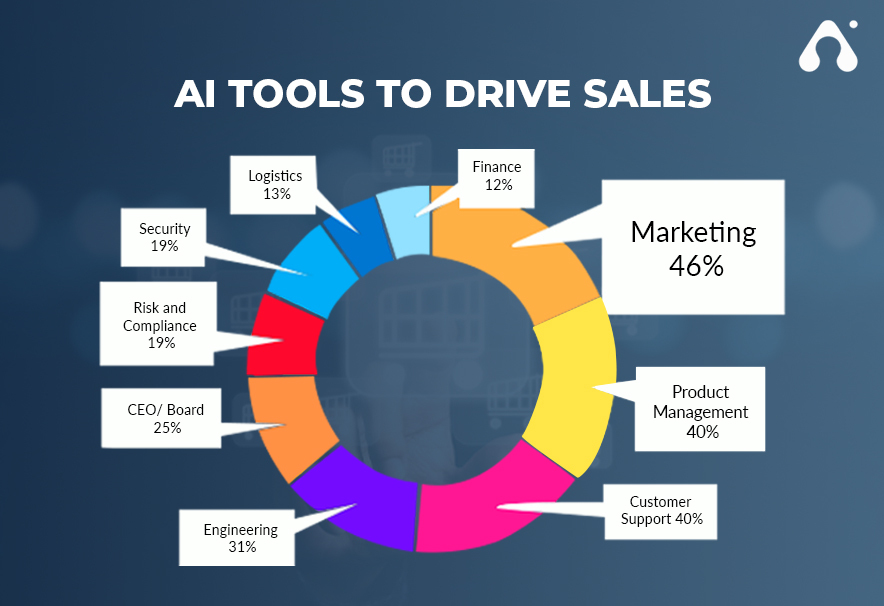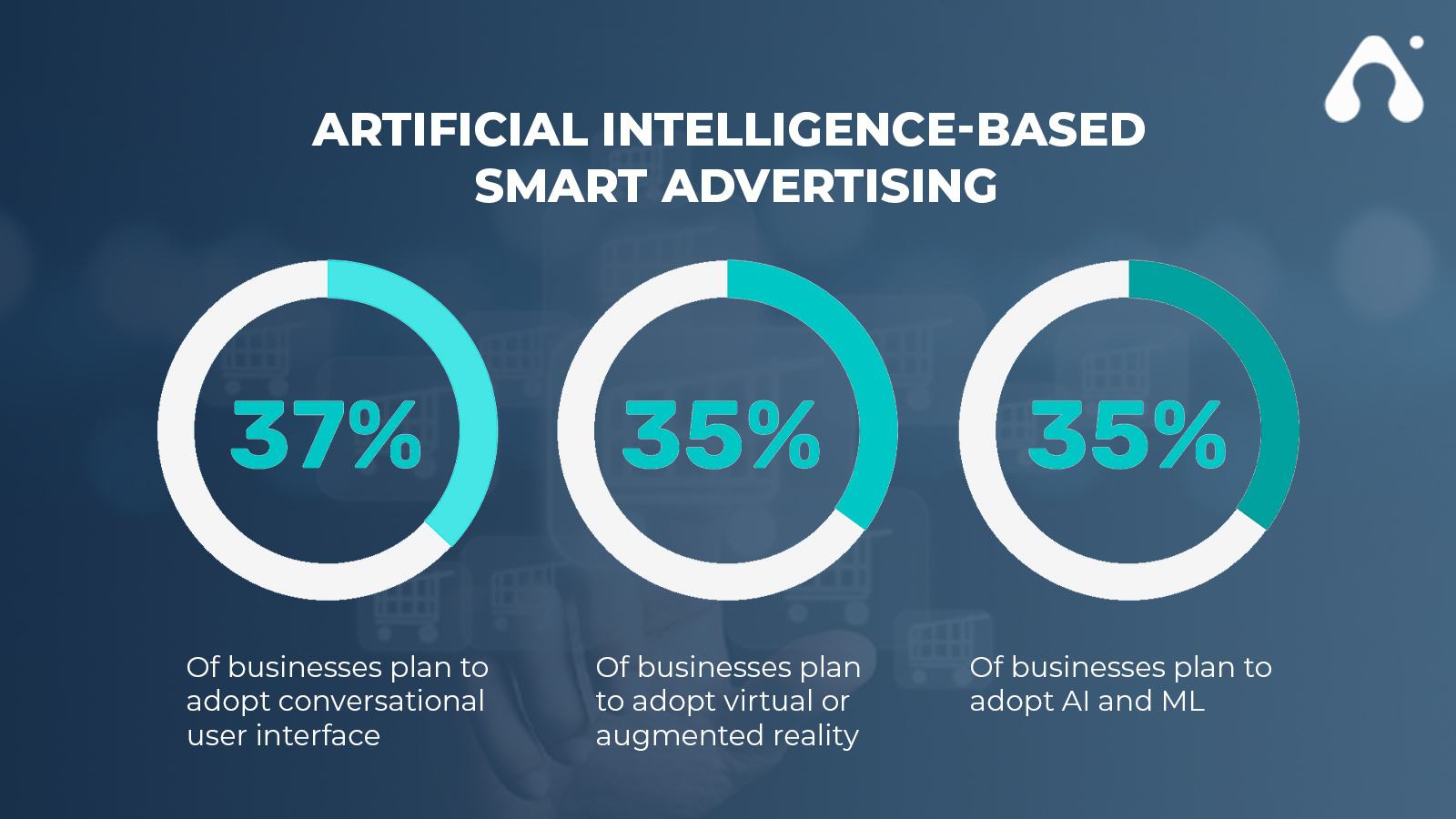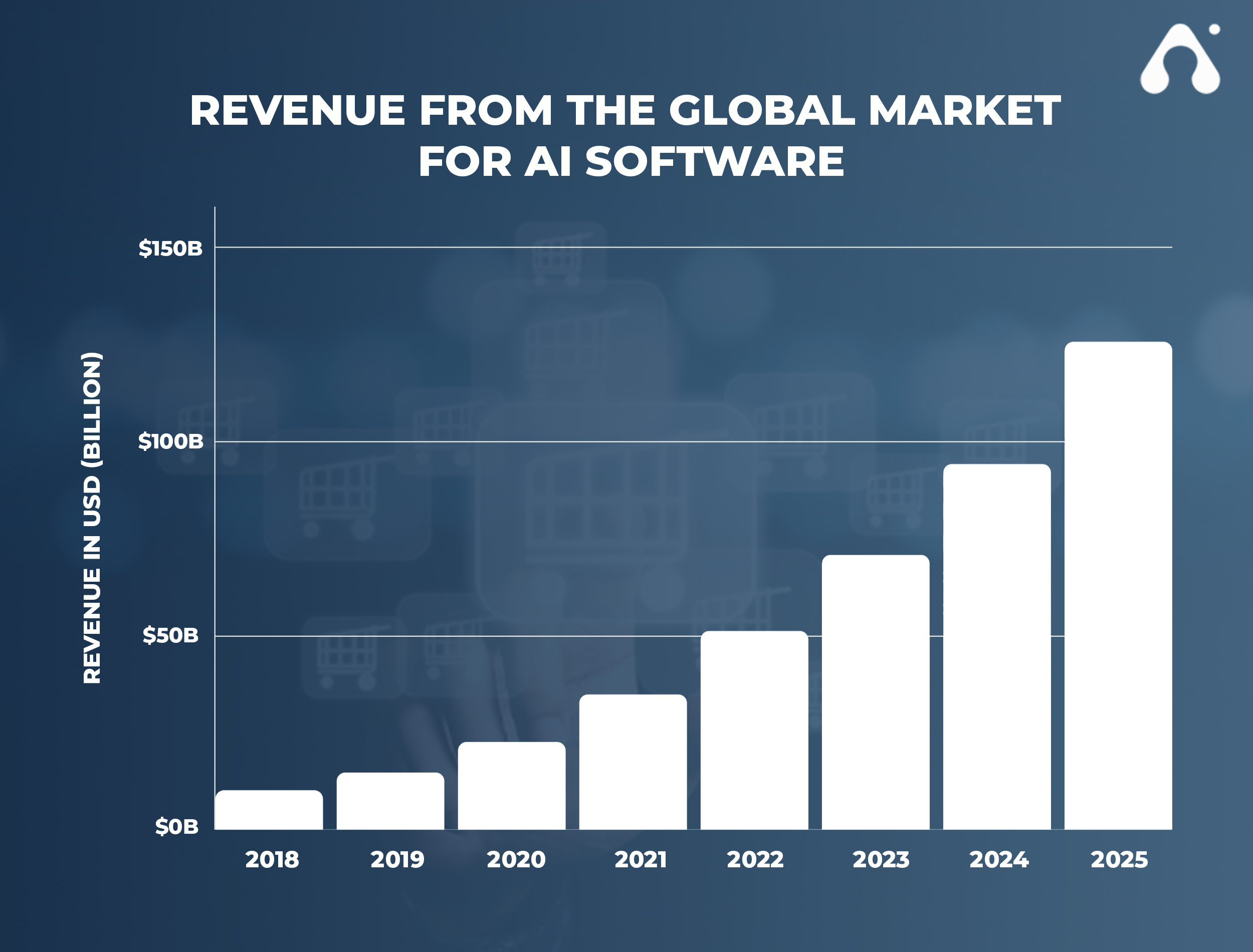70% of customer interaction involves emerging technologies, like chatbots and machine learning; hence, AI is indeed a transforming technology that personalizes the shopping experience, and more.
Updated 26 August 2024

VP - Delivery at Appventurez
Do you have compassion for your clients? Imagine how wonderful it would be to search for a thing, discover it in an instant, buy it, and then get suggestions for similar products. Such a flow gives the impression that an internet retailer is even more familiar with your preferences than your relatives.
Fortunately, such a scenario is possible now. Your online business may speed up product searches and provide a more individualized buying experience by utilizing e-commerce AI solutions like image recognition and machine learning algorithms. Additionally, artificial intelligence’s usage in demand forecasting will prevent “stock-outs.”
By leveraging gathered business and customer data to make better business decisions and more precisely anticipate the future, AI can assist today’s online merchants in providing an improved consumer experience on and off their AI in eCommerce websites.
Let’s examine some of the ways that artificial intelligence (AI) and related technologies are advancing the e-commerce sector, from enhancing client interactions to simplifying operational procedures.
Artificial intelligence and Machine learning in development aren’t the only cutting-edge technology used for the show. Any number of business operations within your firm might be impacted by the AI implementations in eCommerce.
It helps to have a grasp of the elements of artificial intelligence to comprehend how it could affect your business.
Data mining, natural language processing, and machine learning are all included in the wide definition of AI.
The development of AI development services over the previous several years has made it a potent tool for increasing sales and streamlining business processes. Even a large number of tiny trends in e-commerce companies are utilizing AI-capable technologies.
By using computer vision, machine learning algorithms, and data analytics, our AI development team ensures that the primary purpose of an AI in the best e-commerce api is used to increase profit. These innovations improve the functionality of online stores and provide data-driven business insights.

Let’s now examine the applications of AI in eCommerce and choose an AI tool for your online shop and the example of AI in eCommerce examples.
Visual search Users may search for items using photos rather than keywords thanks to AI technologies for e-commerce. These technologies take advantage of the machine learning specialties of computer vision and deep learning. But how do programmers make computers able to see goods?
Your consumers can submit photographs of the products they are looking for using AI in eCommerce search engines. The program then proposes goods with the same color, pattern, kind, etc. after training with your product database management trends.
ASOS, Wayfair, Neiman Marcus, Argos, and IKEA are a few of the online retailers that use these artificial intelligence capabilities. The visual search may deliver 125 percent more page traffic, raise the conversion rate by 11%, and enhance customer acquisition, engagement, and loyalty by 10%.
You don’t need to spend extra money creating such a solution from scratch to get all these advantages. Visual search plug-ins are widely available and prebuilt.
Platforms: Woocomerce, Shopify, Magento
Pricing: Free 14-day trial, paid plans: $9, $29,$49 per month depending on the product number.
Customers may use photographs to search for things with Impresee, and they can even create and design the items they want. The following feature set is present in this tool.
A built-in analytics dashboard is available with Impresee. You may use it to find out about consumer preferences, product trends, and items that customers are looking for to add to your inventory.
With its sophisticated customization tools, the role of AI in eCommerce for visual search allows you to change the size and color of the search buttons to better complement the design of your online business. Among other things, you may alter search results, labels, and result locations.
Platforms: Any web-based (API and JavaScript integrations)
Pricing: By request
You must include this tool in your website using Javascript or an API to utilize it for your online store. Hiring a web development company will help if you are not computer savvy.
Your developers will provide Syte with your catalog in CSV, XML, or another format after the integration. Artificial intelligence will review your product’s photos over 24 hours and do continual auto sync from an FTP (File Transfer Protocol) folder to propose products from your product catalog.
Online clothing shop Boohoo in the UK uses Syte AI for visual search. According to Boohoo’s case study, Syte AI-enhanced its average order value by 12%, increased page views to 100% each session and doubled its conversion rate.
Platforms: Any (Public API, Android, iOS, web SDKs)
Pricing: By request
By combining on-device detectors with cloud-based operations, Slyce, another AI-based solution for visual search, provides prompt and precise search results. The tool provides SDKs (software development kits) for the Android and iOS development platforms so that users may take advantage of the native capabilities of mobile devices. Use Slyce’s web SDK if your online store is solely accessible through the web and does not have a mobile app.
Slyce’s visual search tool can handle photos in 1, 2, and 3 dimensions. Additionally, it has sophisticated picture recognition features:
Platforms: Magento, Prestashop, OpenCart, Shopware, BigCommece, Shopify, WooCommerce, custom (API integration).
Pricing: Free trial for 30 days, self-served from € 99.99/month, managed service from € 999/month.
By offering individualized suggestions in the “Recommended to you” area, Pleisty enables you to automate and enhance on-site merchandising.
In addition, you may use behaviorally targeted banners and display customized advertisements to every website visitor.
Platform: WordPress (WooCommerce)
Pricing: Free
This WooCommerce plug-in for online shops examines what products customers usually purchase together using a machine learning algorithm. Based on this information, Wootomation suggests products to your consumers based on goods other customers have added to their shopping carts.
You may use Wootomation without paying any fees or subscriptions because it is an open-source plug-in. But it also implies that you have to use the Wootomation directory to manually activate and set Wootomation. We advise employing web developers if you are unfamiliar with coding.
There is a help forum for this plug-in where you may post queries and get responses from other contributing developers.
Seventh Sense is artificial intelligence software that can speed up the deployment of email marketing campaigns. It can help increase traffic to the eCommerce shop.
This AI, which is an email marketing tool, may benefit in more than one way. As a result, email inboxes are so noisy that AI must be used to cut through the mess to send emails and data.
Seventh Sense works with HubSpot and Marketo and recommends the following features to increase engagement:
For owners of eCommerce stores, Granify offers simple and quick machine-learning income improvement. It functions in a comparatively simple way. As clients engage with the eCommerce business, Granify gathers 500 behavioral data facts per second.
To assess the likelihood of conversion for the purchasers, it then makes use of this data to mimic billions of other consumer behavioral patterns. When Granify detects a conversion opportunity, it may deliver the best messaging to the customers. Each consumer may get the things they need and want thanks to the predictive analyses it uses.
With Namogoo, eCommerce business owners may increase their profits by using AI to find missing income opportunities. As a result, it does so on both the app and the website of the eCommerce store.
By removing any obstacles from the customer’s digital journey, it becomes easier for them to follow a clear route to a quick and easy checkout. As a result, this will increase sales and encourage customers to make more purchases from online businesses.
Namogoo uses ML in development to comprehend its consumers’ ins and outs so that it may offer tailored incentives. Additionally, it oversees extensions for discounts and price comparisons, prevents rival businesses from stealing clients, etc.
Owners of online stores may use PriSync to research the pricing, business plans, and profit margins of their competitors. Their sales and income increase as a result. PriSync functions with admirably effective efficiency. The following three steps may be used to set it up and use it with ease:
You may be aware of many of the use cases for Artificial Intelligence in e-commerce, but you may not realize that the technology they are based on is connected to the use of AI in e-commerce.

The following four are the most typical:
Data collection and processing for customers’ online buying experiences are now simpler than ever. Based on historical consumer behavior and similar customers, artificial intelligence is being utilized to provide tailored product suggestions.
With AI-enabled dynamic pricing, you can adjust the price of your product based on supply and demand. Today’s systems can forecast when and what to discount based on the correct data, dynamically determining the minimal discount required for the sale.
You may provide the impression of providing higher contact customer care with chatbot development and virtual assistant technology.
E-commerce companies may now better understand their AI customer experience and spot emerging trends thanks to increased access to company and customer data as well as computing capacity.
It’s always enticing to adopt cutting-edge technology. To avoid wasting a lot of time and money on failed attempts, you should have a plan in place before introducing a new program.
You must begin somewhere, and your strategy will outline the steps you must follow to get from that point to your AI objective. Don’t just pass this off to your CIO or CTO or a freshly hired AI specialist.
Consider carefully what you want AI to help you achieve. Use common sense and don’t forget to start small. Later on, you may always expand on your achievements.
Business goals, data distinction, and easily accessible artificial intelligence models come together in the most effective AI use cases. To sum up, you should concentrate on revenue-generating possibilities where you have a data edge and in a setting suitable for tried-and-true AI technology.
You should accept professional guidance on this even if you consider yourself an armchair AI expert. To get started and assist you with creating a strategic AI roadmap, bring in a tiger team on a project- or part-time basis. These third parties can aid in the development of your MVP (minimal viable product) as well.
It’s time to construct the whole solution after you’re satisfied with what your team has created. If it still requires some iterations before it performs as expected, don’t be shocked. You’ll start to reap more rewards from your initiatives as you and your team grow more at ease working in the field of AI.

In the realm of modern commerce, the indispensability of Artificial Intelligence (AI) and machine learning is underscored by the imperative to meet the evolving demands of contemporary shoppers, stay competitive, and enhance e-commerce website profitability. When embarking on the journey of AI app development, these elements become crucial.
For those looking to integrate AI tools into their e-commerce ecosystem, it’s essential to select an option that aligns with your platform, offers a user-friendly pricing policy, and supports necessary integrations.
If none of the tools mentioned in this article meets your specific requirements, or if you aspire to develop a comprehensive solution from the ground up, turn to Appventurez, an esteemed eCommerce app development company specializing in AI development.
Our expertise lies in crafting tailored AI-based pipelines and data analytics to cater to the unique needs of individual businesses. Trust Appventurez to pave the way for your e-commerce success through cutting-edge AI solutions.
Q. How is artificial intelligence used in e-commerce?
By leveraging gathered business and customer data to make better business decisions and more precisely anticipate the future, AI can assist today's online merchants in providing an improved consumer experience on and off their e-commerce websites.
Q. How does artificial intelligence AI bring a great change in eCommerce?
eCommerce companies may customize online experiences and suggest items that are perfectly suited to each customer by utilizing AI. Companies like Amazon and Netflix, who were early users of the technology, have found success with personalized marketing utilizing AI.
Q. How does AI impact customer satisfaction in e-commerce?
Customer support for e-commerce shops is enhanced by artificial intelligence in the form of chatbots. Instantaneously responding, chatbots may offer replies that are customized for each consumer. A smooth shopping experience is the result of this.


Elevate your journey and empower your choices with our insightful guidance.

VP - Delivery at Appventurez
Expert in the Communications and Enterprise Software Development domain, Omji Mehrotra co-founded Appventurez and took the role of VP of Delivery. He specializes in React Native mobile app development and has worked on end-to-end development platforms for various industry sectors.
You’re just one step away from turning your idea into a global product.
Everything begins with a simple conversation.